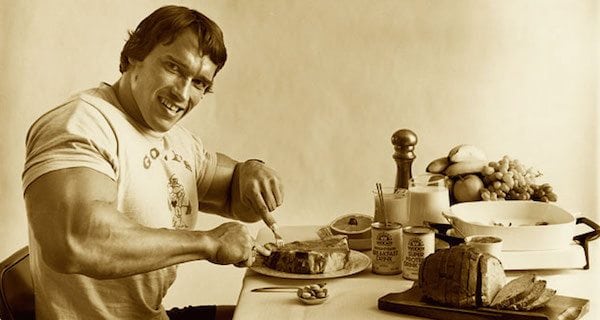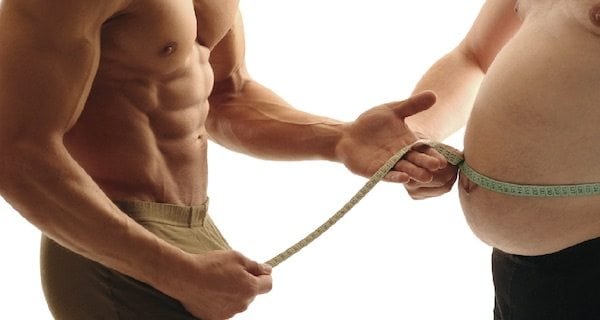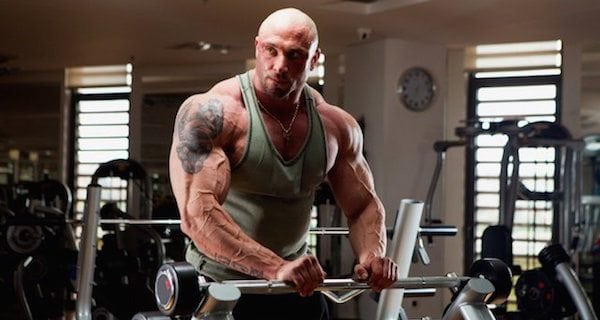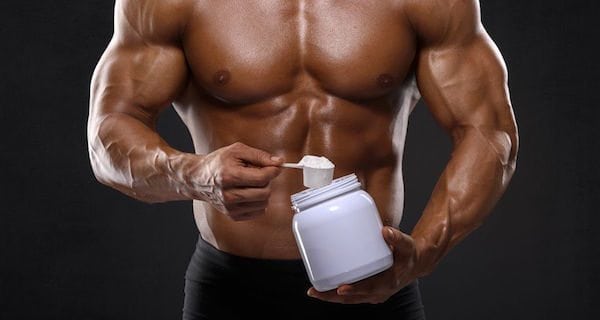No products in the cart.
Bulking for Muscle Mass: An Essential Guide

Chances are that if you have stumbled across this article that you are looking for advice on how to bulk to achieve maximum muscle gains.
Before we start you need to realise that there are no shortcuts, to gain muscle and mass you need to work hard and dedicate yourself to your goal.
If you are willing to put in the effort then achieving a muscular physique is achievable. Lets read on to see how you can bulk with minimal fat gains.[toc]
Before You Start Bulking
Before you start bulking there are a few things you need to consider, for example you should consider both your needs and current situation, and whether there are any limitations or constraints that could hinder your progress.
For example, if you have a family and a full-time job this could be a major constraint.
Once you have figured these out you will be better placed to setting up realistic goals.
Set Realistic Goals
While it would be nice to be able to gain muscle and end up looking like The Rock after just a few months of bulking, chances are this is not going to happen.
Most Hollywood stars and athletes have few constraints so can focus on their diet and training so are able to achieve their muscle building goals much faster than you could.
This is not to say that you cannot achieve impressive results, but you must be realistic with yourself to avoid disappointment.
What Should You Eat When Bulking?
Bulking is not simply a matter of increasing the amount you eat, it is much more complicated than that.
The nutrients you consume are also important, but we will look at this further along in this article.
What Training Regime is Best for Bulking?
Again, simply going to the gym now and then is not enough for major changes to your physique.
You need to understand what regimes are best, as well as training intensity. Rest days are also important for recovery too.
You Should Track Results
For best results when bulking you need to be tracking your calories, weights, sets, reps, rest days, hydration, body weight, BMI, body fat percentage as well as muscle size measurements.
Taking photos of your progress is also a good idea, as you can look back at these photos to visually see how your progress is paying off.
What is your Body Type?
Your body type has a major role when it comes to gaining muscle and mass.
Here are the major body types, and how bulking will vary between them (please be aware that your body type may be a mixture of one or two of these):
The Ectomorph – Those with this body type are often thin with a rectangular body. Thanks to their high metabolism they will struggle to gain muscle, although it is not impossible.
For an ectomorph to gain muscle when bulking it is important that they try to limit cardio.
The Mesomorph – They are usually have a more athletic body, who will find gaining muscle easy to achieve.
You may say that those with this body type are genetically blessed, but you still need to work hard and keep on top of your diet for best results.
The Endomorph – They have a square-shaped body and are prone to fat gain. Those with this body type will find gaining muscle easy, but may struggle to lose any fat that has been gained.
To ensure you gain muscle rather than fat when bulking it is recommended that you watch your calorie intake and to avoid refined sugar if possible.
How Much Do You Need to Eat to Build Muscle?

A common question that is asked is “how much do you need to eat to build muscle”. Well, the best way to answer this question is by working out your BMR or Basal Metabolic Rate, which is basically the number of calories your body needs to maintain its existing weight.
For men you can work out your BMR using the following formula (Harris–Benedict equation [1]):
BMR = (10 × weight in kg) + (6.25 × height in cm) – (5 × age in years) + 5
Women should use the following formula:
BMR = (10 × weight in kg) + (6.25 × height in cm) – (5 × age in years) – 161
As an example, if you were a 30 year old man, who was 180 cm tall and weighed 100 kg the calculation would be as follows:
(10 x 100) + (6.25 x 180) – (5 x 30) + 5
This would equate to a BMR of 1,980, so you would need to consume this amount of calories to maintain your current weight.
The issue with this formula is that it does not include how active you are. Therefore you will need to use the following calculations to work out a better idea of the number of calories you need daily:
- Sedentary: BMR x 1.2
- Very Light Exercise: BMR x 1.375
- Moderate Exercise: BMR x 1.55
- Heavy Exercise: BMR x 1.725
- Extremely Heavy Exercise: BMR x 1.9
So, for example based on our above example who worked out moderately, we would multiply his BMR of 1,980 by 1.55, which gives us a total of 3,069.
This is a lot of calories to consume daily just to maintain his current weight, and may shock you “hardgainers’ who thought they were consuming a lot.
Chances are if you are struggling to bulk that you are simply not consuming enough calories or nutrients to experience growth.
To gain weight or bulk you will need to increase this figure by at least another 500 calories a day, which would take our examples total to over 3,500 calories.
Clean Bulk vs Dirty Bulk: Which is Best?

When people think about bulking there are two main camps people will fall into; those who want to ‘clean’ bulk, and those who wish to undertake a ‘dirty’ bulk, but which is best?
Dirty Bulking – When you are dirty bulking you are not concerned with the nutritional value of food so much, you just want to eat as much of it as possible.
Even if it is junk food, you just don’t care as long as you are getting more calories than you need.
Clean Bulking – When you clean bulk you are trying to get your calories from ‘clean’ sources, so that you keep fat gain to a minimum.
Dirty Bulking Causes Fat Gain
Unfortunately gaining muscle is not simply a matter of adding more calories to your diet.
Your favourite pizza may contain 2,000+ calories, but what benefit do these extra calories offer your muscle building efforts?
There maybe some protein in these junk foods, but there is also a lot of saturated and trans fats included too, which unfortunately will cause you to gain body fat, and chances are a lot of fat.
Dirty Bulking Can Reduce Muscle Growth
Do you favourite junk foods include the necessary nutrients for muscle growth? Probably not.
Not only does your body require protein, but if you are lacking in nutrients like zinc, chromium or iron then chances are you are going to struggle to gain muscle.
Dirty Bulking Can Ruin Your Motivation
Junk food has been shown to negatively affect motivation, and without motivation how are you going to make the much-needed time to work on building muscle, or losing the fat gained once your bulk has concluded?
Clean Bulking is the Best Option
With dirty bulking causing so many issues it is not a hard decision to state that clean bulking is the best option.
Not only will you gain minimal body fat, but your motivation will remain high too.
Research published in the book Human body composition: Growth, Aging, Nutrition and Activity, has also shown that a lean person (with a body fat percentage between 10-15%) who runs a small calorie surplus will convert 60-70% of those calories into muscle.
In comparison those with a higher body fat percentage will convert 60-70% into fat.
Clean Bulking Means More Muscle
To ensure you see maximum muscle gains with minimal body fat gain when undergoing a clean bulk I would suggest following a 2:3:1 ratio of protein, carbohydrates and fats.
Protein for Muscle Growth
Whether you are bulking or cutting it is important that you are consuming enough protein daily.
Protein is the building block of muscle tissue, and is essential for repairing damaged muscle tissue that is broken when we train. It is this damage that causes the muscle to become bigger and stronger.
It is generally thought that you should consume 1 gram of protein per pound in body weight daily [2].
Carbs While Bulking
Building muscle is an energy consuming process, which is why carbs are so important when bulking.
The carbs you consume are broken down into glucose that can then be used for energy.
One method people use to minimise fat gain when bulking is to ensure they consume the bulk of their daily carbs around the time of their workouts.
Importance of Fat When Bulking
Fat is important when bulking, but when undergoing a clean bulk it is important to opt for healthy fats rather than the saturated or trans fats found in junk food.
Fats contain twice the number of calories per gram than both protein and carbs, which makes it easier to hit your calorie targets.
These fats are also important as they help to create hormones and molecules that send signals that prompt muscle growth.
How Often Should You Eat When Bulking?

Would it be easier to eat 4 meals of 1,000 calories, or 8 meals of 500 calories? I know which one I would rather.
While avoiding that feeling of bloating and sickness from gorging on these large meals is just one reason to space your meals apart it is not the only reason.
The main reason is to keep the level of nutrients found in these foods constant in your blood.
When you have large spaces between meals your insulin levels will drop, along with the concentration of nutrients.
By evenly spacing your meals you can ensure the nutrients you consume will stop your body from going into a catabolic state [3], which is when your body breaks down muscle for energy. Something I am sure you do not want to happen.
Build Muscle and Burn Fat at The Same Time
Is it possible to both build muscle and lose fat (body recomposition) at the same time?
Well, this all depends on the individual and their experience.
For most of us this is impossible, which is why you should stick to clean bulking and then a cut, but for some fortunate souls it is possible.
In short, if you are new to lifting, especially heavy lifting then it is possible to both gain muscle while losing fat. You may call them “newbie gains” [4].
For the more experienced lifter chances are you wont be able to achieve this goal.
Foods for Building Lean Muscle Mass
What foods are best to eat when bulking? Basically you need to be looking for foods that are calorie-dense, which are essentially foods that are full of calories but that wont fill you up.
Below are some example of foods you should add to your bulking diet:
#1: Nut Butters
Nut butters like peanut butter, almond butter, pecan butter are full of polyunsaturated fatty acids and are incredibly calorie-dense, with every teaspoon containing 100+ calories.
Research has found that athletes who started adding nut butters to their bulking diet started to gain muscle.
Another benefit of nut butter is that it can reduce the risk of developing type-2 diabetes. This is due to the fatty acids that it contains, which can improve both insulin and glucose sensitivity.
#2: Red Meat
Red meat is a good source of protein, plus contains other nutrients such as creatine, carnosine, and taurine that can help with cellular hydration and muscle growth.
It has also been shown to help with nutrient absorption and blood lipid values, which are both good things for health and longevity.
#3: Whole Milk
While lactose intolerance maybe an issue for some, for most of us trying to bulk drinking whole milk is a great idea.
Just 8 ounces of milk contains 150 calories, with 30% of your daily intake of both calcium and vitamin D.
Both of these nutrients are used to promote bone strength, hormone production and can help improve skin health too.
#4: Olive Oil
Olive oil is heart healthy, as it is full of unsaturated fatty acids.
Just a single tablespoon contains an incredible 120 calories, making it ideal for bulking.
It is also full of antioxidants that can improve your overall health. Including the ability to reduce the risk of cancer and the development of heart disease [5].
You should substitute your usual vegetable oils for olive oil when cooking. It can also be used when making your own salad dressing, simply combine olive oil with pure balsamic vinegar.
#5: Salmon
High quality fish like salmon are a good source of both protein and omega-3 fatty acids [6].
A 4oz portion of salmon contains 2-3 grams of omega-3s, with 180 calories too, ideal for bulking.
One issue with freshwater fish is that they are often contaminated with chemicals like mercury and lead, so it is best to limit your consumption of fish to just a couple of times a week.
#6: Coconut (Oil or Flakes)
Not only is coconut rich in calories with 120 in a single tablespoon, it is also one of the best sources of medium chain triglycerides or MCTs.
It has been shown that unlike other saturated fats, MCTs can improve cholesterol levels and heart health [7].
When choosing between oil or flakes it doesn’t really matter which you opt for, however you should choose extra virgin coconut oil and unsweetened flakes. Coconut is already sweet, so you do not need additional sugar added.
#7: Cheese (Cottage Cheese in particular)
There are plenty of different cheeses that you can use for bulking, but your best bet is cottage cheese.
Cheese is a good source of calcium, vitamin D and vitamin K2, which can all help improve bone health and improve cardiac functioning.
It is also a good source of CLA or conjugated linoleic acid that can prevent the hardening of your arteries, which could potentially cause a heart attack or stroke.
#8: Whole Eggs
Eggs are full of micronutrients that promote good health, including protein and essential fatty acids [8].
They are also packed with calories too, which is ideal when on a bulking diet. A single egg could potentially contain 80 calories.
Once upon a time people were concerned that eating the yolk of an egg would be bad for you. However this has been proven to be incorrect, as the cholesterol it contains can reduce bad cholesterol (LDL), while increasing good cholesterol (HDL).
Forget egg whites, opt for whole eggs instead if you value your health.
#9: Granola
Granola is calorie dense, with a half a cup potentially containing over 200 calories.
It is usually made using a mixture of honey, nuts and oats, sometimes it is made using other grains like puffed rice too. It is then baked until it is crisp and golden brown, either in bar form or as a dry cereal.
Granola is versatile and can be added to plenty of other foods, these include yoghurt and cottage cheese amongst others.
#10: Dark Chocolate
If you have a sweet tooth then you should opt for dark chocolate instead of those varieties made from milk.
Dark chocolate is also full of those much-needed calories but is a much healthier option. This is because of the antioxidants found in its cocoa.
#11: Sweet Potatoes
Sweet potatoes are a good source of complex carbohydrates, which is something you will need for energy when training.
They are also a good source of fibre, protein and beta-carotene, an antioxidant that gives it its distinctive orange colour.
#12: Beans
There are many different varieties of beans available, but our suggestion when bulking is to opt for one of the following types:
- Kidney beans
- Chickpeas
- Black beans
- Pinto beans
- Red beans
Beans are full of essential nutrients, which include both fibre and protein, which you will need to help build muscle.
They are also a good source of magnesium, iron and potassium that will help ensure that your body is functioning as efficiently as possible.
#13: Bananas
Thanks to its potassium content a banana is the perfect snack food for consumption both before after a workout.
If you are deficient in potassium you will be more prone to muscle cramps. Your athletic performance may also suffer.
Bananas are also a good source of simple sugars, which can boost your insulin levels, which helps boost your ability to build muscle.
#14: Greek Yogurt
Greek yoghurt is full protein, contains almost no sugar and is also a good source of calcium.
If you are bulking and want to build muscle you need to add this to your diet.
You can add greek yoghurt to your smoothies, and pretty much any recipe without affecting the taste. That is because while it has a slightly sour taste, it is pretty neutral.
#15: Quinoa
Quinoa (pronounced “keen-wah”) is a grain that is full of antioxidants, magnesium, iron, fibre and protein that is ideal to eat when bulking.
It is a versatile ingredient that can be made in various ways without needing much creativity in the kitchen.
Training While Bulking: How to Train for Maximum Gains

Now we have an idea of how many calories we need and the types of foods that will provide these calories, we now need to discuss how we should train for maximum gains when bulking [9].
While isolation exercises have their place in your training, perhaps if a certain muscle group is lagging behind the others, but the majority of your time and effort should be placed on performing compound movements.
These are exercises that work multiple muscle groups, ensuring you see the greatest muscle gains.
Examples of compound exercises include:
- Bench press
- Squat
- Overhead press
- Deadlift
Progressive Overload
Whichever training regime you choose when bulking, there is one principle you must stick to. And that is you must aim for progressive overload [10].
What this means is that to increase muscle growth, increase strength and to perform better you must use resistance (weight) that is beyond what your body has been subjected to previously.
Each time you train you should keep track of the weight and reps you perform, and then the next time you workout try to increase either or both. Of course, you should this using correct form to ensure you do not injure yourself.
This progressive overload over time will result in tremendous gains being experienced.
When you track your progress you will know what weight you need to lift to ensure you are pushing yourself to your limit.
How Fast You Should Be Gaining Mass?
A general rule of thumb when bulking is that you should aim to gain around 0.5 and 1.5 pounds a week.
If you are new to training then it is likely that you will gain much more than a more experienced lifter. These are known as “newbie gains”.
For those on a clean bulk, it is probably more likely that you will gain less than 0.5 pounds week, but this is because you are gaining less fat than those on a dirty bulk.
One of the most important things you should do is to monitor your progress.
You should weigh yourself, perhaps even measure yourself too. Taking progress photos is also a good way of tracking your bulking progress.
If you are not gaining weight when bulking then you will need to adjust your diet. Add an extra 25-300 calories to your daily intake until you start seeing progress.
Similarly, if you are gaining more than 1.5 pounds a week, then you should lower your calorie intake, otherwise you will be gaining more fat than needed.
We have already stated that the clean bulk is the better option for you, so you need to make sure you are building muscle with minimal fat gains.
Best Supplements for Bulking

While supplements can aid with muscle building, it is far less important than diet and training, hence why this section is below those two.
One issue I have with supplements is that this industry is full of companies and products that make impressive claims, but are unable to back them up.
Often their products are full of junk ingredients, or not enough good ingredients to offer any benefit to you.
If you are looking for the best supplements to use when bulking I would suggest looking for the following:
Creatine
Creatine is found naturally in your body as well as in red meat.
If you supplement with creatine then you will experience the following benefits [11]:
- Muscle and strength gains
- Improved anaerobic endurance
- A reduction in muscle damage and soreness
Some may say that creatine can harm your kidneys, but if you have healthy kidneys this is not an issue. If you however have kidney disease then it is advised that you avoid it.
Protein Powder
What bulking diet would be complete without protein powder?
You need protein to grow, and while it would be nice to be able to get your daily intake from food alone chances are this wont be possible.
Think of it like this, what would be easier to achieve? Eating 8 protein-rich meals, or supplementing a few of these meals for a protein shake. I know which I would choose.
There are a variety of options available to you. I would suggest trying some of the major brands to find one that tastes best.
Pre Workout
An effective pre workout supplement can get you fired up for a workout. This will ensure you are able to give 100% at the gym.
You need to be careful when choosing a pre workout to ensure not only that it works, but is also safe to use too.
There have been a countless number of products that make big claims that turn out to be totally ineffective. Some have even been found to contain dangerous or banned ingredients, such as ‘Jack3d’ that contained DMAA.
When looking for a pre workout I would suggest buying one that contains one or more of the following ingredients:
- Caffeine – A natural stimulant that can give you an energy boost, while also increasing muscle endurance and strength.
- Beta-Alanine – A naturally occurring amino acid that can reduce exercise induced fatigue. It can also help to improve endurance.
- Citrulline Malate – Another amino acid that can improve endurance, while also helping to provide relief from muscle soreness.
- Betaine – A compound found in beetroot that can increase strength and endurance. It also helps to increase the production of HGH and insulin-like growth factor 1.
- Ornithine – An amino acid found in dairy products and red meat. It can help reduce fatigue in prolonged exercise.
- Theanine – Helps to reduce mental and physical stress. It also helps to increase the production of nitric oxide. This helps improve blood flow, and can help improve alertness, focus, attention, memory, mental task performance, and mood.
It is also important to check that any potential supplement is made without any artificial sweeteners or flavours, or any filler ingredients.
We have compiled a list of our best bulking supplements. If you are looking to gain muscle and strength then I would suggest that you check this list out.
Common Reasons Why Bulking Diets Fail
There are a few reasons why bulking diets fail, here are some of the more common reasons for failure:
#1: You have No Plan or Strategy
Have you ever heard the phrase “fail to plan, plan to fail”? Well, if you are expecting to bulk without following some of the steps laid out in this article then you are going to fail.
Bulking is not easy and is not a matter of just eating more food. You need to plan and strategise to see the best results.
#2: You are Not Eating Enough
Hardgainers are often shocked at how few calories they actually consume.
Take a week to track your calorie intake. Plus work out how many calories you need to maintain your current weight. If the numbers are similar then you know that you are not consuming enough.
#3: You are Eating Too Many Calories
Consuming too many calories can leave you with too much body fat, which could leave you feeling unmotivated.
You need to remember that if you choose to dirty bulk that any body fat gained will need to be lost at the end of the bulk.
This can be complicated and done incorrectly could result in those hard-earned gains being lost.
#4: You Do Not Mix Up Your Diet
Unless you have money to burn then hiring a nutritionist to devise a meal plan for you is out of the question.
If you are eating the same meals day after day then you will soon get bored of your diet. To avoid this happening you should try and mix up your food choices.
We have suggested some foods you should be eating when bulking. I would have a browse online for recipes you can use that contain them.
In Conclusion
Hopefully this article has given you a glimpse of just how difficult a bulk can be.
The following is a list of things you should do to ensure your bulk is successful. Check off the points and you will be able to succeed:
- Use the Harris-Benedict equation to calculate your basal metabolic rate
- Work out how many calories you need after adding physical activity
- Consume enough calories daily (500 calories more). To get big you need to eat big
- Don’t fill up on junk food; you need a balanced diet of protein, good fats, carbohydrates and other nutrients
- Train at 100% using compound movements
- Take an appropriate bulking supplement

Can you do cardio while bulking?
You can, but too much will reduce your ability to build muscle.
Eat like a pig. Do as heavy as your body can do in 6-8 reps, 3-4 sets, and what your body can do.
Be consistent to your workouts and don’t cheat!
Hi Jonathan, do you have any tips on some cheap foods good for bulking? I’m getting very frustrated trying to find some. Thanks.
You may want to check out the following article. 🙂
As a physician, I often have patients who complain of muscle cramps and want to have their potassium level tested. I always concede to the request but have never in ten years of practicing military medicine had a patient deficient in potassium who was complaining of muscle cramps. This aligns with medical texts. The most common cause of muscle cramps is dehydration so the remedy is to drink more water (and fewer dehydrating drinks with caffeine and alcohol). I recommend editing the portion of the article about bananas and potassium and muscle cramps.